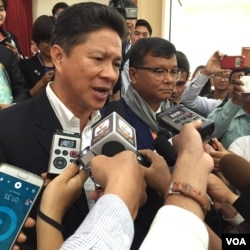Cambodian Prime Minister Hun Sen is pushing ahead with his controversial reform agenda with a midterm cabinet reshuffle designed to win back political ground lost to the opposition in 2013 elections.
Eight ministers face the axe, despite resistance from a bureaucracy used to getting its way and practiced in shrugging off allegations of nepotism and corruption.
It was the second reorganization in two years aimed at sparking reforms that are designed to win broad public support before commune elections due in 2017 and general elections in July 2018.
The midterm reshuffle, announced last week, means new ministers for foreign affairs, land management, commerce, agriculture, transport, rural affairs and religion. The National Assembly is expected to formally approve the moves on April 4.
Two ministry leaders retained
Importantly, two ministries – education and environment – survived the latest shakeout.
More significant, analysts said, was the retention of Education Minister Hang Chuon Naron, who launched a crackdown on cheating, grade inflation and corrupt teaching practices in the nation's schools almost two years ago. The pass rates of all high school students fell to an abysmal 25.7 percent from a previous average of almost 87 percent. Makeup exams followed, but failure rates remained high. Meanwhile, teacher wages were raised to help end the practice of billing children in class.
"I think there's a satisfaction or general agreement with what the new minister Dr. Naron is doing," said Ray Leos, dean of communications and media arts at Pannasastra University. "I think he is obviously one of the stars of this cabinet."
Leos said Naron had accomplished much in his short tenure, but reforms would take years to produce the desired results.
"He's moving forward and trying to institute reforms," Leos said. "It's a challenging process and I think he's done a lot. And the fact that education was unaffected would indicate the prime minister is pleased with what the education minister is doing."
Environment
Likewise, Minister of Environment Say Samal has introduced the biggest reforms in decades, said Marcus Hardtke, an environmentalist who has worked in Cambodia for many years.
That includes a significant shift of resources from the Ministry for Agriculture, Forestry and Fisheries (MoAFF), which has traditionally controlled the nation's land. The MoAFF ministry has faced allegations of corruption related to land grabs. Under MoAFF stewardship, great swaths of the nation’s rain forests had been stripped after the granting of economic land concessions (ELCs), often to foreign corporations.
But since the announced reforms, sources said MoAFF officials have persistently tried to block efforts to have what's left of Cambodia's jungles transferred to the Environment Ministry’s control. This has led to accusations that loggers were doubling their efforts to extract lumber ahead of any bureaucratic change.
Hardtke welcomed the new appointments, saying bureaucratic change was necessary.
"But on the ground, it would just mean a change in uniform and not a change in better protection or better concepts or better zoning or better law enforcement or anything like that," he said, pointing out that environmental reforms were still in their infancy.
Reaction to unrest?
Analysts say the ruling Cambodian People’s Party (CPP) is pressing the reforms to deflect increased public anger over corruption and a rapidly widening wealth gap. The CPP held onto power in the 2013 elections, but with a substantially reduced majority, and faced yearlong protests afterward.
Ou Virak, chief executive of the Future Forum think tank, said lack of clarity over land titles was leading to disputes not just among traditional farmers but also among the rich and well connected and within families, particularly where inheritances were concerned.
He said appointing Chea Sophara to the land management ministry should help smooth this process.
“The other significant one is actually the ministry of land management. There's a lot of corruption going on with that ministry. There're also a lot of issues with land disputes, land conflicts,” he said.
Document leaked
The reshuffle followed the leak of a CPP internal document urging the government to pick up the pace of reforms in an attempt to win over young voters – 65 percent of the population is under age 30 – and reconnect with grassroots supporters.
Among those retiring is long-serving Foreign Minister Hor Namhong.
He was replaced by Prak Sokhon, 61, a former adviser to Hun Sen. He was appointed to the cabinet as minister of posts and telecommunications after the divisive 2013 poll.
The opposition Cambodian National Rescue Party (CNRP) has said it would wait until the reshuffle is approved before commenting. However, its acting president, Kem Sokha, told The Khmer Times the changes were cosmetic and failed to address systemic problems confronting the country.








